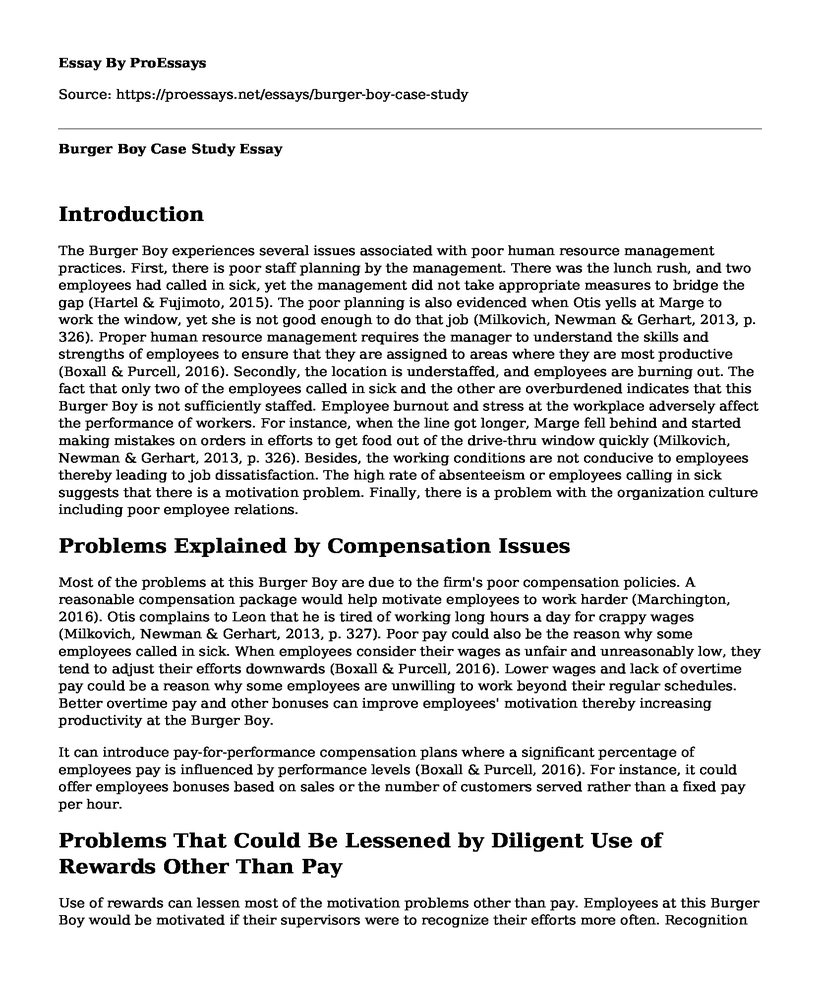Introduction
The Burger Boy experiences several issues associated with poor human resource management practices. First, there is poor staff planning by the management. There was the lunch rush, and two employees had called in sick, yet the management did not take appropriate measures to bridge the gap (Hartel & Fujimoto, 2015). The poor planning is also evidenced when Otis yells at Marge to work the window, yet she is not good enough to do that job (Milkovich, Newman & Gerhart, 2013, p. 326). Proper human resource management requires the manager to understand the skills and strengths of employees to ensure that they are assigned to areas where they are most productive (Boxall & Purcell, 2016). Secondly, the location is understaffed, and employees are burning out. The fact that only two of the employees called in sick and the other are overburdened indicates that this Burger Boy is not sufficiently staffed. Employee burnout and stress at the workplace adversely affect the performance of workers. For instance, when the line got longer, Marge fell behind and started making mistakes on orders in efforts to get food out of the drive-thru window quickly (Milkovich, Newman & Gerhart, 2013, p. 326). Besides, the working conditions are not conducive to employees thereby leading to job dissatisfaction. The high rate of absenteeism or employees calling in sick suggests that there is a motivation problem. Finally, there is a problem with the organization culture including poor employee relations.
Problems Explained by Compensation Issues
Most of the problems at this Burger Boy are due to the firm's poor compensation policies. A reasonable compensation package would help motivate employees to work harder (Marchington, 2016). Otis complains to Leon that he is tired of working long hours a day for crappy wages (Milkovich, Newman & Gerhart, 2013, p. 327). Poor pay could also be the reason why some employees called in sick. When employees consider their wages as unfair and unreasonably low, they tend to adjust their efforts downwards (Boxall & Purcell, 2016). Lower wages and lack of overtime pay could be a reason why some employees are unwilling to work beyond their regular schedules. Better overtime pay and other bonuses can improve employees' motivation thereby increasing productivity at the Burger Boy.
It can introduce pay-for-performance compensation plans where a significant percentage of employees pay is influenced by performance levels (Boxall & Purcell, 2016). For instance, it could offer employees bonuses based on sales or the number of customers served rather than a fixed pay per hour.
Problems That Could Be Lessened by Diligent Use of Rewards Other Than Pay
Use of rewards can lessen most of the motivation problems other than pay. Employees at this Burger Boy would be motivated if their supervisors were to recognize their efforts more often. Recognition can be oral or written comments appreciating employee's good work. Such make employees more confident and enhances intrinsic motivation which leads to job satisfaction (Bradler et al., 2016). This is not the case at this Burger Boy. Leon complimented Jerry for the good job (Milkovich, Newman & Gerhart, 2013, p. 326). That was the first compliment Jerry had received in two weeks, and he smiled at the unexpected recognition (Milkovich, Newman & Gerhart, 2013, p. 326). Other rewards include free meals, improved job titles, handwritten thank you note, among other non-monetary rewards (Bradler et al., 2016).
Hours of Work as a Reward
More hours of work is not necessarily a reward. In a workplace like Burger Boy, more hours of work means a higher pay yet this can lower an employee's motivation. For instance, Chuck is unhappy working for 30 hours a week but Newman is happy working 20 hours a week (Milkovich, Newman & Gerhart, 2013, p. 327). Work schedule is an essential tool for motivating employees. When scheduling work, the supervisor should consider the fact that employees need to achieve work/life balance. Employees need time for their families and may not sacrifice such for additional pay. For instance, Marge has to leave by 2.30 to pick her daughter at school (Milkovich, Newman & Gerhart, 2013, p. 327). Supervisors should consult employees when scheduling shifts to ensure that the work/life balance is not interfered with. Favorable work schedules also prevent employee burnout, which is one of the major cause of absenteeism and employee turnover (Deery, 2008, p. 792). According to Avanzi et al. (2013, p. 455), there is a positive association between employee over-commitment and burnout over time.
References
Avanzi, L., Zaniboni, S., Balducci, C., & Fraccaroli, F. (2013). The relation between overcommitment and burnout: does it depend on employee job satisfaction?. Anxiety, Stress, & Coping, 27(4), 455-465. doi: 10.1080/10615806.2013.866230
Boxall, P., & Purcell, J. (2016). Strategy and human resource management. New York: Palgrave Macmillan.
Bradler, C., Dur, R., Neckermann, S., & Non, A. (2016). Employee Recognition and Performance: A Field Experiment. Management Science, 62(11), 3085-3099. doi: 10.1287/mnsc.2015.2291
Deery, M. (2008). Talent management, worklife balance and retention strategies. International Journal Of Contemporary Hospitality Management, 20(7), 792-806. doi: 10.1108/09596110810897619
Hartel, C., & Fujimoto, Y. (2015). Human resource management. Frenchs Forest, NSW: Pearson Australia.
Marchington, M. (2016). Human resource management at work. London: Chartered Institute of Personnel and Development.
Milkovich, G., Newman, J., & Gerhart, B. (2013). Compensation. University of Oregon, John Henry Nash Fine Arts Press.
Cite this page
Burger Boy Case Study. (2022, Nov 24). Retrieved from https://proessays.net/essays/burger-boy-case-study
If you are the original author of this essay and no longer wish to have it published on the ProEssays website, please click below to request its removal:
- Leadership Through Innovation Paper Example
- Fallacies of Relevance in Ford-Firestone Paper Example
- Achieving Sustainable Development: Balancing Social, Economic & Environmental Capital
- Ethical Leadership: Respect, Fairness, Honesty and Trust - Essay Sample
- Paper Example on Integrity and Humility: A Nurse Leader's Core Values
- Bridging Gaps, Fostering Maturity, and Building Meaningful Relationships in Organizations - Paper Sample
- Paper Sample: Engagement in Professional Nursing







